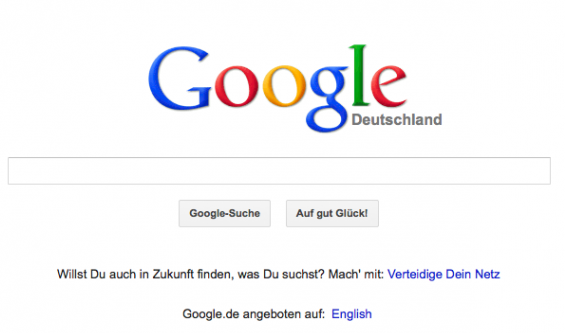Google Wins Street View Reprieve In Germany But Confronts New Pro-Newspaper Copyright Restrictions
Google dodged a bullet in Germany this week as prosecutors in Hamburg decided, after a lengthy investigation, not to pursue criminal charges against the company over Street View WiFi data collection. Essentially prosecutors found that Google lacked the requisite “criminal intent” to justify prosecution. Google faces another, arguably more daunting legal challenge in Germany however. […]
 Google dodged a bullet in Germany this week as prosecutors in Hamburg decided, after a lengthy investigation, not to pursue criminal charges against the company over Street View WiFi data collection. Essentially prosecutors found that Google lacked the requisite “criminal intent” to justify prosecution.
Google dodged a bullet in Germany this week as prosecutors in Hamburg decided, after a lengthy investigation, not to pursue criminal charges against the company over Street View WiFi data collection. Essentially prosecutors found that Google lacked the requisite “criminal intent” to justify prosecution.
Google faces another, arguably more daunting legal challenge in Germany however. It’s now confronting a proposed “ancillary” copyright rule that could go into effect early next year and effectively eliminate Google’s ability to index German news sites without licensing their content. France is similarly trying to make Google pay for linking to news content.
Intended for “the protection of news publishers” the proposed German law singles out news aggregators and search engines in particular. It still must be ratified by the German Parliament. Below is a high level summary of the law based upon an unofficial English translation:
On August 29 2012, German federal government passed a revision of the national Copyright Act granting ancillary copyright protection for news publishers. This move intends to give publishers a similar protection of their investments in content as other creative industries such as music and film have enjoyed for decades. The rapid growth of aggregation on the internet left publishers often unprotected against business models relying on copying their material. . . The revision is being sent to German parliament Bundestag for deliberation.

If passed there would be nothing like “fair use” when it comes to news in Germany. The new law contemplates that presentation of news content will be compensated or entirely disallowed, although the language of the law doesn’t stipulate anything about payment beyond “a reasonable share of the remunerations issuing from the author’s work.”
The Google Germany homepage prominently features a link to a site set up to rally German internet users and “educate” them about the risks and dangers of the new law. Among the dangers Google envisions are damage to the German economy, job losses and legal uncertainty.
Google further argues that German news publishers can currently opt-out of being indexed and so the new law is unnecessary. That claim is technically correct; however it satisfies neither the publishers nor the authors of the new copyright rules. Google’s site attacking the proposed copyright changes calls on Germans to “defend your network.”
Google also argues it delivers huge value to German news publishers through the traffic it directs to them. However, as the quoted excerpt above suggests, German authorities argue the proposed law merely seeks to “give [news] publishers a similar protection of their investments in content as other creative industries such as music and film have enjoyed for decades.” Interestingly the language of the statute anticipates Google’s and other critics’ objections and contains statements such as: “The introduction of a new ancillary copyright must not, however, be misunderstood as a legislative form of protection of old and outdated business models.”
If passed the law could effectively kill Google News in Germany. It would also force Google to license news content or presumably go without news content in its main index. Assuming the law passes it will be very interesting to see how it impacts both Google and news publishers in Germany. It would be a widely watched experiment around the world.
Google’s consumer proposition relies substantially on the comprehensiveness of Google’s index. The new law would put a dent in that proposition.
In the aftermath of the law’s passage, would German publishers be able to gain more direct traffic without Google? Or, would they simply lose traffic that Google wasn’t sending them?
While the law does seek to extend “protections” to German news publishers there’s a way in which it also seeks to punish Google, which the authors of the legislation clearly consider to be parasitic. The law probably contemplates that Google won’t entirely de-index German news publishers. Thus it would operate as a kind of “news tax” or news subsidy.
We’ll see if Google is a able to rally public opinion against it.
Contributing authors are invited to create content for Search Engine Land and are chosen for their expertise and contribution to the search community. Our contributors work under the oversight of the editorial staff and contributions are checked for quality and relevance to our readers. The opinions they express are their own.
Related stories
New on Search Engine Land